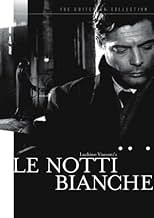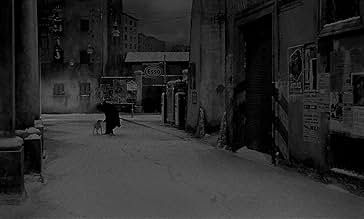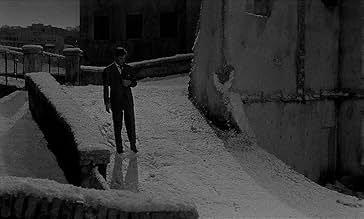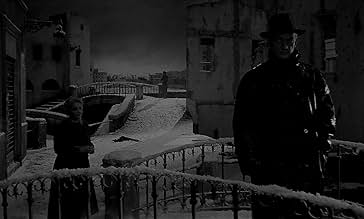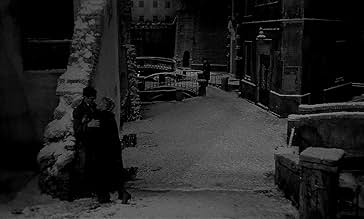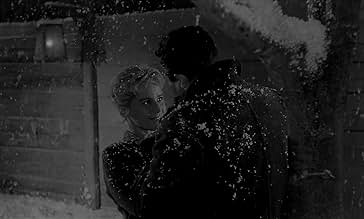NOTE IMDb
7,7/10
9,7 k
MA NOTE
Un humble clerc courtise une femme qui, nuit après nuit, attend le retour de son amant.Un humble clerc courtise une femme qui, nuit après nuit, attend le retour de son amant.Un humble clerc courtise une femme qui, nuit après nuit, attend le retour de son amant.
- Réalisation
- Scénario
- Casting principal
- Récompenses
- 7 victoires et 7 nominations au total
Maria Zanoli
- La domestica
- (as Maria Zanolli)
Dirk Sanders
- Il ballerino
- (as Dick Sanders)
Giorgio Albertazzi
- L'inquilino
- (non crédité)
- …
Lys Assia
- La cantante
- (non crédité)
Alberto Carloni
- Il locandiere
- (non crédité)
Dino D'Aquilio
- Un ragazzino
- (non crédité)
Enzo Doria
- Il marinaio che balla
- (non crédité)
Avis à la une
A mythic, Venice-like city is an appropriate backdrop for a film which must have greatly offended European critics at the time who had thought of Visconti as one of the pioneers of the new realism in Italian Cinema (and indeed with Ossessione and La Terra Trema, he was!). But with this film Visconti seems to have changed his idea of what he wants in a film: instead of the pursuance of realism at all costs, we have a dream-like fairy tale about fairy tales.
Mario (Marcello Mastroianni) meets Natalia (Maria Schnell) one night, and is entranced. But as they begin to talk, over a couple of nights, he falls in love with her, and realises that she is already in love with another man. Maria is obsessed with a fairy-tale man (Jean Cocteau's leading man Jean Marais), who up and left her a year ago without explanation and said he would return in a year, and if she still loved him, he would be there for her.
This film is evocative and beautiful - i'd love to see it in a clean theatrical print - especially the snow scenes at the end.
Its a very satisfying cinema experience, and one of Visconti's most beautiful films. 8/10.
Highlights: the dancing scene! Snow scenes are beautiful, but the dancing scene stands head and shoulders above the rest of the movie. Marcello is shy and introverted - he is sitting in a night club with dreamy Natalia. When couples start getting up and busting some very cool moves to Bill Haley and the Comets' Thirteen Women, Mario becomes nervous and starts talking to her about himself, talking around the fact that he's a shy person and doesn't like dancing and physical things... he likes dreaming, solitude... But when he sees how interested Natalia is by another man pulling some mean dance moves, things change. Great scene.
Mario (Marcello Mastroianni) meets Natalia (Maria Schnell) one night, and is entranced. But as they begin to talk, over a couple of nights, he falls in love with her, and realises that she is already in love with another man. Maria is obsessed with a fairy-tale man (Jean Cocteau's leading man Jean Marais), who up and left her a year ago without explanation and said he would return in a year, and if she still loved him, he would be there for her.
This film is evocative and beautiful - i'd love to see it in a clean theatrical print - especially the snow scenes at the end.
Its a very satisfying cinema experience, and one of Visconti's most beautiful films. 8/10.
Highlights: the dancing scene! Snow scenes are beautiful, but the dancing scene stands head and shoulders above the rest of the movie. Marcello is shy and introverted - he is sitting in a night club with dreamy Natalia. When couples start getting up and busting some very cool moves to Bill Haley and the Comets' Thirteen Women, Mario becomes nervous and starts talking to her about himself, talking around the fact that he's a shy person and doesn't like dancing and physical things... he likes dreaming, solitude... But when he sees how interested Natalia is by another man pulling some mean dance moves, things change. Great scene.
A wonderful, very touching rendition of Dostoevsky's 1848 short story "White Nights."
A lonely young man (Marcello Mastroianni) meets and instantly falls for a young woman (Maria Schell) in the street one night, but finds out she is waiting for a man who she fell in love with a year ago, and who promised to return (Jean Marais). As Mastroianni makes headway with Schell in the other man's absence and she tells him honestly that it would take time for her devotion to change, we see that it's a dual story of needing the patience to wait for love to come around, which may have one outcome or another.
Director Luchino Visconti gives us a dreamy atmosphere in the streets at night with beautiful framing, lights, and fog. The scenes in the rain and snow were memorable, and I loved how tightly he told this story, including the use of the flashback. It's a romantic tale full of the emotions from the heart, but he avoids it from being cloying, and includes a wonderfully long dance scene, including the energy and passion of strangers dancing, as well as the couple's awkward attempts (Mastroianni is pretty funny).
Another amusing scene is when Mastroianni promises to help Schell write a letter to the other man, and after they begin, she gently guides him. "Dear Sir," he begins, and she says no, "Kind Sir." He goes on with "Excuse me for writing to you, but you must forgive..." and she interjects with "Forgive my impatience but..." He admits that sounds all right and continues "For a whole year I've been waiting," and she interrupts with "I've been sustained by a joyous hope..." It's a lovely scene between the two, and shows us the Mastroianni's conflicted emotions and Schell's sweetness.
Mastroianni turns in an excellent performance, and the scene under the bridge is fantastic. I think Schell was probably a little less successful in her role, as she seemed to lack depth and smiled too often, but at the critical moments she delivered. The rest of the cast are in much smaller parts, some of which worked (the grandma is adorable), and some of which seemed a little off (Marais, playing the other guy, seems way too old, though I found the difference in ages wasn't as big as I would have guessed; Maris 44 and Schell 31).
The film gets better as it goes along and finishes strong, with a powerful ending that's brilliantly shot by Visconti.
My favorite quote from the film is from that fantastic scene under the bridge, with Schell in Mastroianni's arms, and he says to her: "I wish I could make you fall asleep like the character in the fairy tale, who'll only wake up on the day she is to find happiness. It'll be like that for you too. One day you'll wake up and find that it's a lovely day. The sun will be shining, and everything will be fresh and clean. What once seemed impossible will seem simple and natural."
A lonely young man (Marcello Mastroianni) meets and instantly falls for a young woman (Maria Schell) in the street one night, but finds out she is waiting for a man who she fell in love with a year ago, and who promised to return (Jean Marais). As Mastroianni makes headway with Schell in the other man's absence and she tells him honestly that it would take time for her devotion to change, we see that it's a dual story of needing the patience to wait for love to come around, which may have one outcome or another.
Director Luchino Visconti gives us a dreamy atmosphere in the streets at night with beautiful framing, lights, and fog. The scenes in the rain and snow were memorable, and I loved how tightly he told this story, including the use of the flashback. It's a romantic tale full of the emotions from the heart, but he avoids it from being cloying, and includes a wonderfully long dance scene, including the energy and passion of strangers dancing, as well as the couple's awkward attempts (Mastroianni is pretty funny).
Another amusing scene is when Mastroianni promises to help Schell write a letter to the other man, and after they begin, she gently guides him. "Dear Sir," he begins, and she says no, "Kind Sir." He goes on with "Excuse me for writing to you, but you must forgive..." and she interjects with "Forgive my impatience but..." He admits that sounds all right and continues "For a whole year I've been waiting," and she interrupts with "I've been sustained by a joyous hope..." It's a lovely scene between the two, and shows us the Mastroianni's conflicted emotions and Schell's sweetness.
Mastroianni turns in an excellent performance, and the scene under the bridge is fantastic. I think Schell was probably a little less successful in her role, as she seemed to lack depth and smiled too often, but at the critical moments she delivered. The rest of the cast are in much smaller parts, some of which worked (the grandma is adorable), and some of which seemed a little off (Marais, playing the other guy, seems way too old, though I found the difference in ages wasn't as big as I would have guessed; Maris 44 and Schell 31).
The film gets better as it goes along and finishes strong, with a powerful ending that's brilliantly shot by Visconti.
My favorite quote from the film is from that fantastic scene under the bridge, with Schell in Mastroianni's arms, and he says to her: "I wish I could make you fall asleep like the character in the fairy tale, who'll only wake up on the day she is to find happiness. It'll be like that for you too. One day you'll wake up and find that it's a lovely day. The sun will be shining, and everything will be fresh and clean. What once seemed impossible will seem simple and natural."
I watched the film many times and thought that the film has been shot at Venezia.
Now I'm wathching the film again and saw some street names, like these : Scali delle pietre, Scali del Pesce etc. I began to search these names and found that the film location is not Venezia,but it is Livorno.
If you pay attention the street names or place in the film, you could find same location in Livorno. There is very little changes after 60 years.
If you pay attention the street names or place in the film, you could find same location in Livorno. There is very little changes after 60 years.
This film is very good indeed. Visconti confirms what everybody knows: he is a master! The plot is based on a Dostoievski tale, where a love triangle is explored in the minimum psychological details. Actually, it shows the impact of a powerful passion on human behavior, it tries to explore the incredible power that love has on people's behavior, mainly when passion and irresistible attraction are present. The author tries to show that we are capable of believing anything as well as having childish attitudes when we are confronted with passion. Moreover Visconti is very elegant when dealing with all the elements, combining them with great precision.
Also it is fine to see Maria Schell and Mastroianni acting.
Also it is fine to see Maria Schell and Mastroianni acting.
In some ways, "Le Notti Bianche" is a strange film for me. On one hand, it has some of the best cinematography you'll ever see in a black & white film. The composition, the lighting, the mist--it all is so perfect. Yet, on the other hand, the story itself is so slight that I felt very unfulfilled at its conclusion.
The film begins with a lonely man wandering about the waterfront late at night. Although you'd think a guy that looks like Marcello Mastroianni would not have trouble finding a relationship, but in this film he is quite alone. By chance, he meets a very strange woman (Maria Schell). She is VERY shy--and behaves a bit oddly. However, despite this, he vows to stop by the same place they met and see her, if she wants, the following night. From this very inauspicious beginning, two lonely people meet and form a friendship....and perhaps more. Eventually, you understand some of her weird behaviors--she's actually waiting for another man (Jean Marais)--a man who you assume will never come.
There really is NOT a lot more to the film than my description. It isn't a bad film but I wanted more. I liked Mastroianni's character (though he was a sad fellow) but found Schell's perplexing and hard to believe. I also thought their relationship a bit hard to believe as well--going from total strangers to talking about marriage WAY too fast. In fact, the story itself was only okay--but the film earns a 7 simply for its look. Not a particularly enjoyable or engaging film for me--and it receives a very, very mild recommendation from me.
The film begins with a lonely man wandering about the waterfront late at night. Although you'd think a guy that looks like Marcello Mastroianni would not have trouble finding a relationship, but in this film he is quite alone. By chance, he meets a very strange woman (Maria Schell). She is VERY shy--and behaves a bit oddly. However, despite this, he vows to stop by the same place they met and see her, if she wants, the following night. From this very inauspicious beginning, two lonely people meet and form a friendship....and perhaps more. Eventually, you understand some of her weird behaviors--she's actually waiting for another man (Jean Marais)--a man who you assume will never come.
There really is NOT a lot more to the film than my description. It isn't a bad film but I wanted more. I liked Mastroianni's character (though he was a sad fellow) but found Schell's perplexing and hard to believe. I also thought their relationship a bit hard to believe as well--going from total strangers to talking about marriage WAY too fast. In fact, the story itself was only okay--but the film earns a 7 simply for its look. Not a particularly enjoyable or engaging film for me--and it receives a very, very mild recommendation from me.
Le saviez-vous
- AnecdotesAustrian actress Maria Schell learnt the script in Italian and spoke all her lines in Italian during the shooting, which won her the admiration of the Italian cast and crew. It was subsequently decided not to dub her voice by an Italian actress, which was the usual practice at the time.
- Gaffes(at around 4 mins) When the bar closes and the owner exits it, he pretends to take out keys from his pocket to lock the door. But, as the camera moves away, the actor portraying the owner of the bar, can be seen putting the keys back in his pocket without locking the door.
- ConnexionsEdited into Meine Schwester Maria (2002)
- Bandes originalesThirteen Women
Written by Dicky Thompson (as Thomson), Gadda and Lidianni
Decca Records Inc. New York U.S.A.
Performed by Bill Haley and the Comets (as Bill Haley and His Comets)
Meilleurs choix
Connectez-vous pour évaluer et suivre la liste de favoris afin de recevoir des recommandations personnalisées
- How long is White Nights?Alimenté par Alexa
Détails
- Date de sortie
- Pays d’origine
- Langue
- Aussi connu sous le nom de
- Nuits blanches
- Lieux de tournage
- Sociétés de production
- Voir plus de crédits d'entreprise sur IMDbPro
Box-office
- Montant brut mondial
- 6 497 $US
- Durée1 heure 42 minutes
- Couleur
- Mixage
- Rapport de forme
- 1.66 : 1
Contribuer à cette page
Suggérer une modification ou ajouter du contenu manquant

Lacune principale
By what name was Les nuits blanches (1957) officially released in Canada in English?
Répondre
![Regarder Trailer [OV]](https://m.media-amazon.com/images/M/MV5BZDE1MmJhZTctZDhhNC00ZmYxLTgzYmQtODc4ZTE1YTM3NTAxXkEyXkFqcGdeQXRyYW5zY29kZS13b3JrZmxvdw@@._V1_QL75_UX500_CR0)
